Scotland is facing an ‘extreme’ wildfire warning after a string of dramatic blazes hit the country.
Emergency services were deployed to battle raging fires that were hitting vast tracts of land in both rural and urban areas.
Huge plumes of smoke could be seen as the fires raged turning the night sky red.
Emergency services were yesterday battling infernos in Cumbernauld, Dunbartonshire, Glen Rosa, Isle of Arran, and in Thurso, Caithness.
Some people were forced to evacuate because of the threat – with one kennel seeing staff having to launch a night-time rescue mission to bring its animals to safety.
Fire chiefs yesterday called on people to act responsibly after the extreme warning was issued for the whole of Scotland for today (SAT).
Forecasters said temperatures would today climb to 20c, and, amid the hotter than usual weather, the Scottish Fire and Rescue Service said all areas would fall under its ‘extreme’ wildfire warning for the next 24 hours.
So far this month there has been just 0.2mm of rain fall in Scotland, well below the 33mm normally recorded, and high temperatures have been almost 4c warmer than normal.
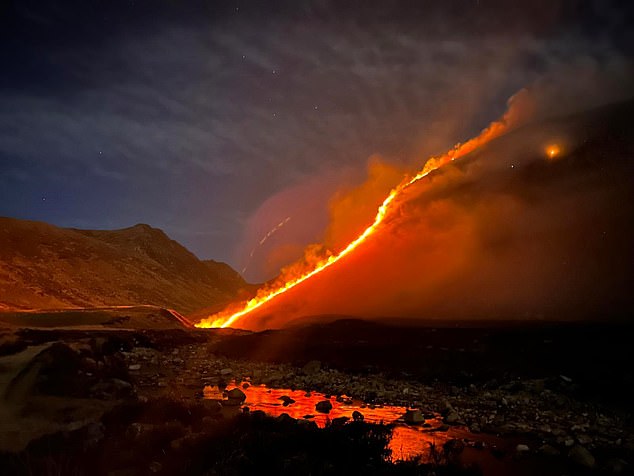
Terror at night: The wildfire in Glen Rosa on the Isle of Arran
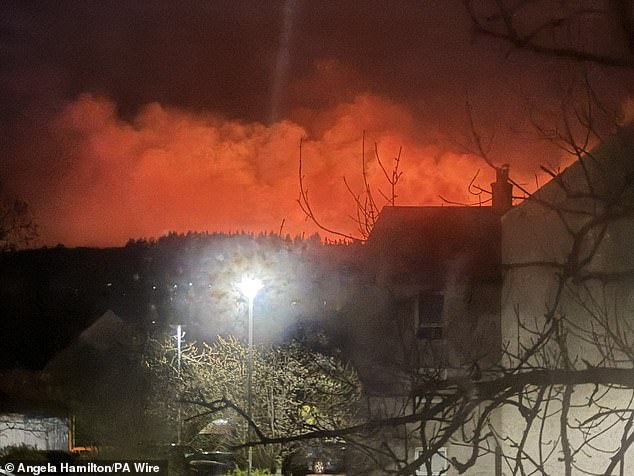
Too close for comfort: Wildfires as seen from a house in Cumbernauld, Lanarkshire
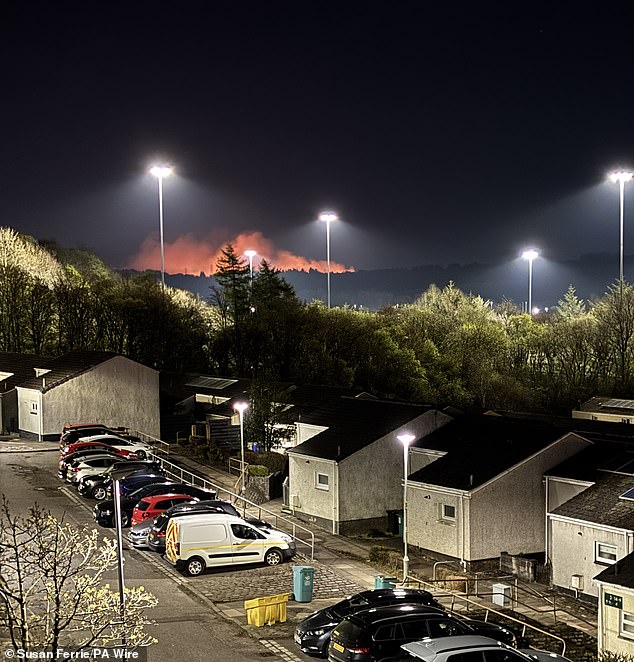
Closing in: Residents in Cumbernauld could see the fire on the hills in the distance
Met Office data showed Scotland has basked in far more sunshine than normal.. Within the first ten days of April there has been 165 hours of sunshine, 74 per cent of what would typically be seen in the whole month.
But with the glorious weather, the potentially deadly threat of wildfires has become a daily risk.
This week there has also been fires at The Gramps, Aberdeen, the Pentlands just outside Edinburgh, Rothesay in the Isle of Bute, and other areas.
Firefighters were called to Fannyside Loch near Cumbernauld on Thursday evening and were still battling the large grass fire last night.
As the blaze started to advance on nearby properties, staff at Crowbank Kennels and Cattery were forced into action.
Just 30 minutes after noticing a glow in the distance, the fire was quickly approaching the property and owner Eran Yehudai had no choice but to evacuate.
Distressingly last night the 61-year-old and his wife Fiona had to evacuate again amid as the threat against their home and business remained.
Amid the wave of wildfires shocking images have emerged from across Scotland – with the blazes lighting up the night sky as they ripped through bone dry vegetation.
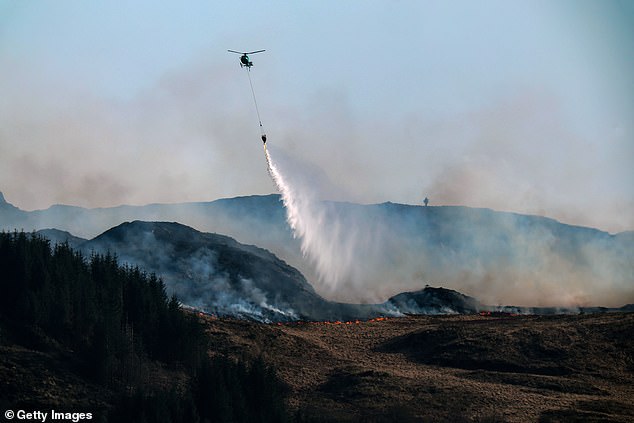
To the rescue: A helicopter douses a wildfire with water on the Isle of Bute
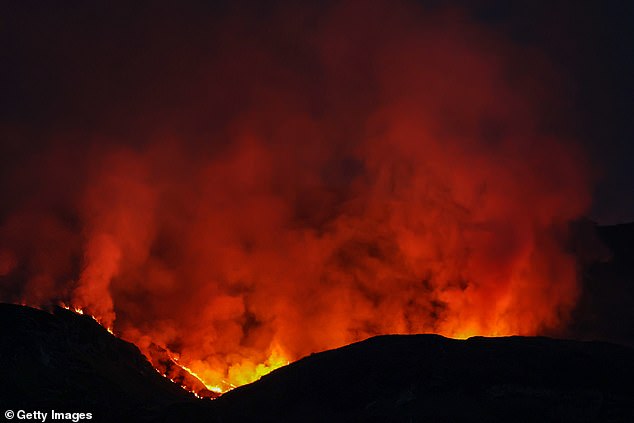
Hellscape: A wild fire burns on the Isle of Bute
With temperatures set to climb again tomorrow – approaching but remaining below the 22.7c seen earlier this week – the public is being urged to take care.
Michael Humphreys, of the fire service, said: ‘[In] the majority of fires it is human behaviour that starts the fire in the first place.
‘If you normally use a barbeque maybe think about taking a picnic instead of using a designated area.
‘Take all your litter home, glass can reflect and start a fire, and if you do smoke just make sure your cigarette is absolutely fully out.’
Despite it not being the height of summer, the Scottish Fire and Rescue Service said it is called out to the largest number of wildfires between the months of March and June.
Because of the amount of dead vegetation around in the winter and early spring, combined with low humidity and sunny weather, it dries out rapidly.
It means fires can be easily ignited and, with help from dry ground and breeze, can spread rapidly.
As well as the disruption it causes to humans, wildfires have a devastating effect on wildlife.
Ruchir Shah, of Scottish Wildlife, said: ‘Wildfires are disastrous for wildlife, with the potential to destroy already threatened habitats such as woodlands and wetlands.
‘It is particularly worrying to see so many fires at this time of year, as many species will be preparing and maintaining nesting sites in order to raise their young.
‘We would encourage anyone visiting our reserves or other areas in the countryside to be extra careful during this dry spell.’
In news which will be welcomed by firefighters across Scotland, next week will bring much cooler conditions as the high pressure which kept more typical Scottish weather away finally moves out.
Jason Kelly, Met Office chief meteorologist, said: ‘A change is on the way this weekend, as we say goodbye to the wall-to-wall sunshine.
‘High pressure sinks southwards and allows low pressure to take hold bringing more cloud, rain and showers, and also lower temperatures.
‘The far northwest of Scotland will start to see the change as rain and drizzle lingers into Saturday.
‘The weekend will start dry for much of the UK, with the best of the sunshine in Scotland and northern and eastern England.
‘By Sunday conditions will be fresher, with sunny spells and light to moderate winds.’